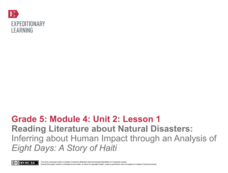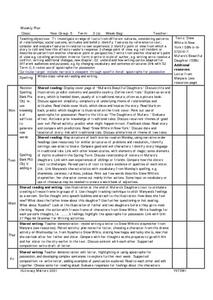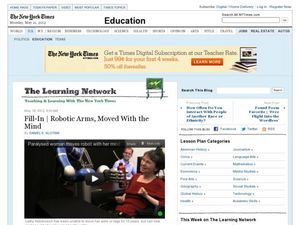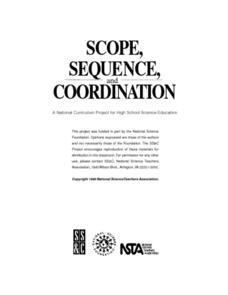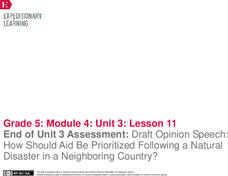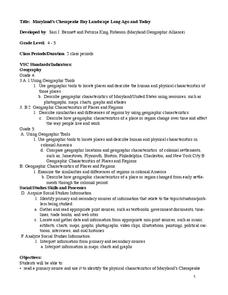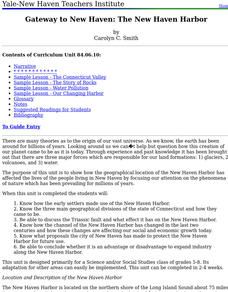EngageNY
End of Unit Assessment, Part 2: Research and Response
Talk it out. Scholars complete part two of the assessment by participating in a World Café discussion activity. Learners circulate the room, sharing their ideas and thoughts about Canada's natural resources using quotes and paraphrasing...
Curated OER
Building New York
Eighth graders study the five points neighborhood in New York City. For this NYC lesson, 8th graders research websites to help them understand the five points neighborhood.
EngageNY
End of Unit Assessment, Part 1: On-Demand Essay “What Makes A Hurricane A Natural Disaster?”
It's time to refine writing and word choice. Learners work on Part 1 of their end of unit assessment by creating an essay titled What Makes a Hurricane a Natural Disaster? They use glossaries and graphic organizers from previous lessons...
EngageNY
Reading Literature about Natural Disasters: Inferring about the Impact of Hurricane Katrina on People Living in New Orleans
I survived! Scholars read a firsthand account from a natural disaster survivor in the text Save Bella! They record the gist of the text in their journals and answer text-dependent questions. They then take notes to more deeply analyze...
EngageNY
Reading about the Author’s Perspective: Why Do Authors Write about Natural Disasters?
It's all about perspective. Scholars view a note from the author in Eight Days. They determine the gist and discuss what they can learn about the author's background based on the note. They then complete a fishbowl activity in which they...
EngageNY
Reading Literature about Natural Disasters: Inferring about Human Impact through an Analysis of Eight Days: A Story of Haiti
This is a disaster. Scholars look through the book Eight Days: A Story of Haiti and discuss their wonderings about the text and natural disasters. They then complete a first read to determine gist and second read to answer text-dependent...
Digital Public Library of America
The American Whaling Industry
When thinking about the American whaling industry most imagine Moby Dick and Nantucket sleigh rides, harpoons and scrimshaw, whale-oil lamps and baleen in women's corsets. But it may come as a surprise that the industry was also...
Curated OER
Salmon Vs. Dams: the Dam Removal Debate on the Elwha River
Young scholars role-play a meeting of the Elwha River council in which they present opposing views to council members on hydroelectric power and salmon fisheries resources. They brainstorm possible conflicts between various people in...
Curated OER
The African Burial Ground
Students analyze African American burial grounds. In this African American history lesson, students draw conclusions about African American communities in early New York and consider how archeology made it possible to study the communities.
Curated OER
"Mufaro's Beautiful Daughters"
Fifth graders read and analyze the books "Snow White in New York" and "Mufaro's Beautiful Daughter." They analyze the characteristics of the characters in each story, write thoughts of characters in speech bubbles, and write a letter to...
Curated OER
New York State Testing Program: Book 1 grade 7
In this seventh grade mathematics worksheet, 7th graders are provided with problems of a similar nature to those on the state proficiency examination. The twenty-four page worksheet contains thirty multiple choice questions. Answers...
Curated OER
Brain-Controlled Robotic Arms: Cloze activity with Article
Fascinating content about current medical research on brain-controlled prosthetics comes in cloze activity form with a link to the original article. Useful for listening and reading comprehension skills development, and for any science...
Curated OER
The Correlation Between Human Population Growth and Dwindling Natural Resources
Eighth graders predict human population growth. In this lesson, 8th graders discuss the length of time needed to double the human population, work in groups to chart population growth and predict population growth in the...
Curated OER
Variations in Living Things
Biology beginners observe traits in a collection of plant parts to realize the tremendous amount of genetic variation within a species. They consider rules of nature and discuss what would happen if they changed. They also examine data...
Curated OER
New York State Testing Program English Language Arts Book 1--Grade 7 (2006)
In this New York State Testing Program English Language Arts worksheet, students read several passages and two poems and answer reading comprehension questions. Students then write an essay response to one of the passages.
Curated OER
It's Art ... Naturally
Students consider the ways nature has been used in art, and then design and create their own original sculptures using materials from nature for a class exhibit.
Curated OER
Art, Naturally
Students read an online article which examine different works of art. They study how patterns and shapes found in nature influence art. Finally, they create original works of art and write artist's statements.
EngageNY
End of Unit 3 Assessment: Draft Opinion Speech: How Should Aid Be Prioritized Following a Natural Disaster in a Neighboring Country?
Put it to the test. With the cumulative resource, pupils complete the End of Unit 3 Assessment. Using everything they've learned in the unit, they write a draft of an opinion speech about how to prioritize aid after a natural disaster.
Curated OER
Maryland’s Chesapeake Bay Landscape Long Ago and Today
Combine a fantastic review of primary source analysis with a study of Captain John Smith's influence on the Chesapeake Bay region in the seventeenth century. Your young historians will use images, a primary source excerpt, and maps...
Global Oneness Project
Ancient and Modern Worlds
The old aphorism, "The road to Hell is paved with good intentions," might well serve as the title for a resource that asks viewers to consider the plight of the people of the Gamo Highlands, an area in southwestern Ethiopia. These...
EngageNY
End of Unit Assessment Part II: Science Talk
Scholars complete Part 2 of their end of unit assessment by having a science talk. Pupils pair up to answer questions about what makes a natural disaster. As one learner talks, the other records what is said. They then trade places.
Carnegie Mellon University
Marcellus Shale: Who Pays?
After viewing short clips of unfortunate events, your class will consider two sides of a homeowner's court case, and then learn about the Marcellus shale deposit beneath the state of Pennsylvania and the hydraulic fracturing process. In...
Curated OER
Gateway to New Haven: The New Haven Harbor
Students study how the geographical location of the New Haven Harbor has affected the lives of the people living in New Haven by focusing our attention on the phenomena of nature which has been prevailing for millions of years in this...
Curated OER
The Statue of Liberty: The Meaning and Use of a National Symbol
Engage your class in a series of activities, each related to the use or analysis of symbols used to convey patriotic or national concepts. They identify different national symbols and explain their meanings, discussing the importance of...







